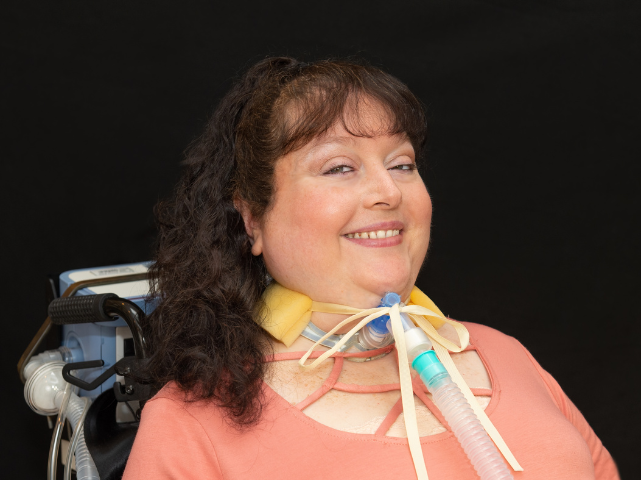Updated February 12, 2024: It is with great sadness that the Harvard Alumni Association notes the loss of Brooke Ellison AB ’00, MPP ’04, a beloved member of the Harvard community who passed away on February 4, 2024, at the age of 45. Founding president of the Harvard Alumni Disability Alliance Shared Interest Group, Ellison will be remembered as an unwavering champion for people with disabilities, a vocal advocate for stem cell research, a leading scholar of medical ethics, and an accomplished author and public speaker who inspired countless others by sharing her experiences and insights.
Brooke Ellison AB ’00, MPP ’04 is dedicated to finding and advocating for ways society can optimize opportunities for people with disabilities to ensure everyone is included. “You can’t have full inclusion without accessibility,” she says.

An author, speaker, activist, and scholar, Ellison is an associate professor at Stony Brook University, where she focuses on the ethics and policy of science and health care—particularly the intersection of disability and bioethics—and exploring strategies to make health care accessible to all.
“Questions around medical ethics have long been approached and understood from a medical model—that disability is a physical issue at the individual level,” says Ellison. This has led to ableist biases that assume people with disabilities have a reduced quality of life compared with the rest of the population, she explains—a perception that can lead to detrimental decisions around issues such as resource allocation, who gets access to care, and when to end medical treatment or interventions. “All of these questions deeply implicate the lives of people with disabilities, but they are very rarely approached from a disability-related standpoint.”
Ellison received her undergraduate degree from Harvard College in cognitive neuroscience and a master’s in public policy at Harvard Kennedy School (HKS). She credits her Harvard experience for providing the community, friendships, and tools to explore her own perspective as a person with quadriplegia and develop her voice as a mechanism for change. She has since become a vocal leader in the disability inclusion space, advocating for stem cell research, running for New York State Senate, and writing two books that reflect on her journey.
In 2020, she founded Brooke Ellison Leadership and Inclusion Strategies, which works with innovators, organizations, and corporations on making their operations and products fully inclusive of people with disabilities. As vice president for technology and innovation at the United Spinal Association, Ellison also advises technology companies and startups in this capacity.
“Technology can be the mechanism by which people with disabilities achieve the fundamental human rights that we all care about,” she says. “There are many interventions society can create to maximize quality of life for people with disabilities if we just think about it more holistically and inclusively.”
One obstacle to this is that many diversity, equity, and inclusion conversations often leave out disability, Ellison says, pointing to problematic or simply absent representation of people with disabilities in media and society. Providing more employment opportunities or making improvements to transportation and the built environment can help to increase the presence and visibility of people with disabilities in their communities.
Amplifying Alumni Perspectives
Together with Robert Manson MPA ’04, Daniel Florio MPA ’15, and Diana Samarasan MPA ’04, Ellison has spearheaded the formation of the first-ever Harvard Alumni Association (HAA) Shared Interest Group (SIG) focused on disability. Formally recognized by the HAA in June 2023, the Harvard Alumni Disability Alliance aims to build community and elevate the lives, experiences, and accomplishments of alumni with disabilities. It will also pursue initiatives to integrate disability inclusion into all aspects of society.
“Our goal is for disability to be so reflexively brought into every conversation that it’s never thought of as something we can choose not to include,” she says.
The SIG is open to people of all abilities—a central component in advocacy work. “Disability is not just an application or a characteristic that we can apply to some people. It is an aspect of society,” Ellison says. This requires solutions from everyone, whether it’s creating an inclusive environment at work, helping raise awareness more broadly, or finding ways to develop and provide the resources that are essential for people with disabilities to live full, rich lives.
“I hope people can understand that this work is extremely important, but it is enormous and unachievable without everyone’s insights and help shouldering what needs to get done,” she says.
Ellison dedicates a chapter in her most recent book, Look Both Ways, to an HKS course on adaptive leadership, recognizing it as foundational to understanding how her own depth of experience could benefit the world in important ways. With the Harvard Alumni Disability Alliance, she is helping to amplify the perspectives of a community that has been historically marginalized and bring together some of the best minds to advance disability inclusion at the University and beyond.
“Disability is something that needs to be appreciated and celebrated for the value it provides everybody,” Ellison says. “When we have a greater number of people with insightful and creative perspectives drafting policies, creating art, thinking about big questions, and solving problems, the world is fundamentally a better place.”